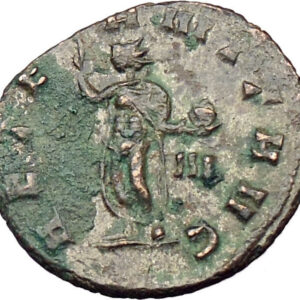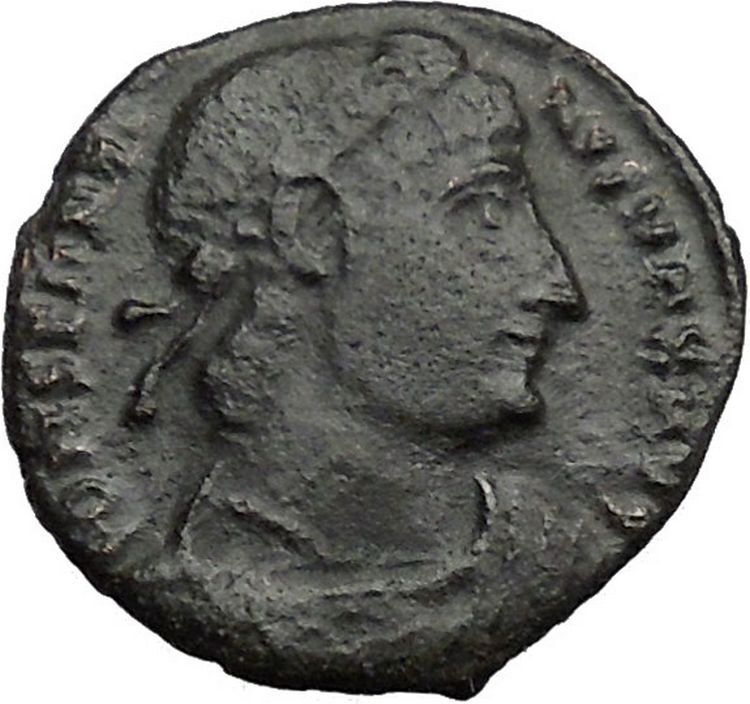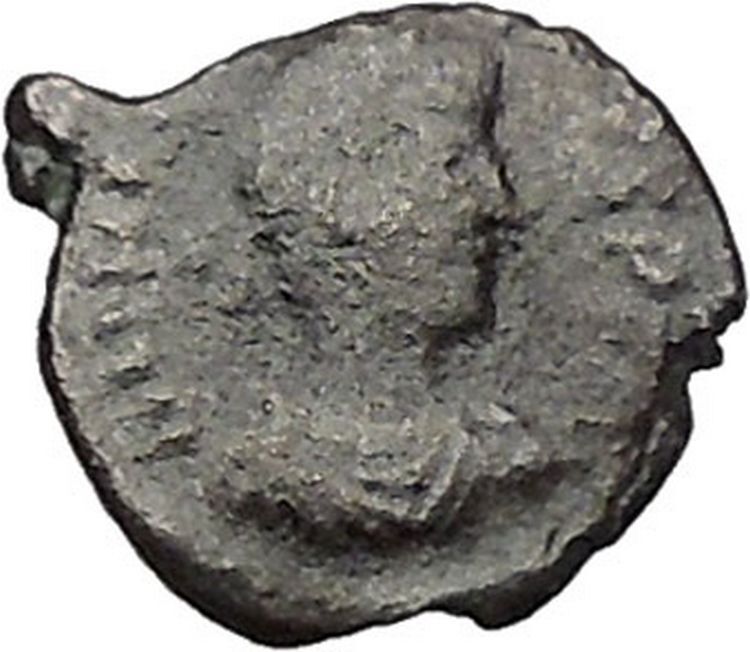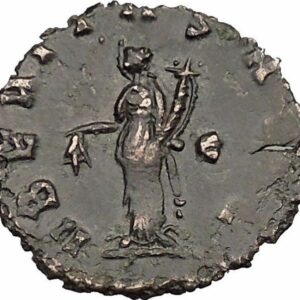|
Quintillus – Roman Emperor: 270 A.D.
Bronze Antoninianus 20mm (2.75 grams) Struck 270 A.D.
IMPQVINTILLVSAVG – Radiate, draped and cuirassed bust right
FORTVNAREDVX Exe. T – Fortuna standing left, holding rudder on globe and cornucopia.
You are bidding on the exact item pictured, provided with a Certificate of Authenticity and Lifetime Guarantee of Authenticity.
Fortuna (Latin: Fortūna, equivalent to the Greek goddess Tyche) was the goddess of fortune and personification of luck in Roman religion. She might bring good luck or bad: she could be represented as veiled and blind, as in modern depictions of Justice, and came to represent life’s capriciousness. She was also a goddess of fate: as Atrox Fortuna, she claimed the young lives of the princeps Augustus‘ grandsons Gaius and Lucius, prospective heirs to the Empire.
Her father was said to be Jupiter and like him, she could also be bountiful . As Annonaria she protected grain supplies. June 11 was sacred to her: on June 24 she was given cult at the festival of Fors Fortuna.
Cult

Fortuna and Pontos
Fortuna’s Roman cult was variously attributed to Servius Tullius – whose exceptional good fortune suggested their sexual intimacy – and to Ancus Marcius. The two earliest temples mentioned in Roman Calendars were outside the city, on the right bank of the Tiber (in Italian Trastevere). The first temple dedicated to Fors was attributed to the Etruscan Servius Tullius, while the second is known to have been built in 293 BC as the fulfilment of a Roman promise made during later Etruscan wars The date of dedication of her temples was 24 June, or Midsummer’s Day, when celebrants from Rome annually floated to the temples downstream from the city. After undisclosed rituals they then rowed back, garlanded and inebriated. Also Fortuna had a temple at the Forum Boarium. Here Fortuna was twinned with the cult of Mater Matuta (the goddesses shared a festival on 11 June), and the paired temples have been revealed in the excavation beside the church of Sant’Omobono: the cults are indeed archaic in date. Fortuna Primigenia of Praeneste was adopted by Romans at the end of 3rd BC in an important cult of Fortuna Publica Populi Romani (the Official Good Luck of the Roman People) on the Quirinalis outside the Porta Collina. No temple at Rome, however, rivalled the magnificence of the Praenestine sanctuary.
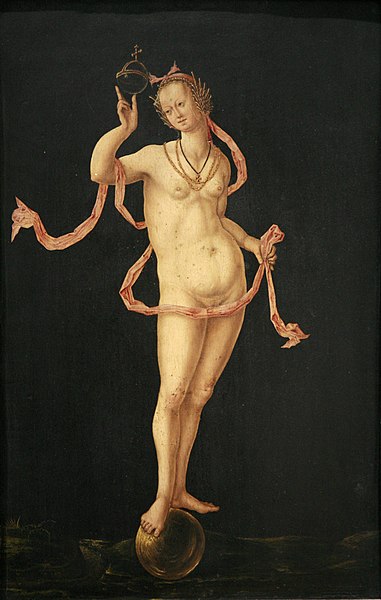
Fortuna lightly balances the orb of sovereignty between thumb and finger in a Dutch painting of ca 1530
(Musée des Beaux-Arts de Strasbourg)
Fortuna’s identity as personification of chance events was closely tied to virtus (strength of character). Public officials who lacked virtues invited ill-fortune on themselves and Rome: Sallust uses the infamous Catiline as illustration – “Truly, when in the place of work, idleness, in place of the spirit of measure and equity, caprice and pride invade, fortune is changed just as with morality”.
An oracle at the Temple of Fortuna Primigena in Praeneste used a form of divination in which a small boy picked out one of various futures that were written on oak rods. Cults to Fortuna in her many forms are attested throughout the Roman world. Dedications have been found to Fortuna Dubia (doubtful fortune), Fortuna Brevis (fickle or wayward fortune) and Fortuna Mala (bad fortune).
She is found in a variety of domestic and personal contexts. During the early Empire, an amulet from the House of Menander in Pompeii links her to the Egyptian goddess Isis, as Isis-Fortuna.[11] She is functionally related to the God Bonus Eventus, who is often represented as her counterpart: both appear on amulets and intaglio engraved gems across the Roman world.
Her name seems to derive from Vortumna (she who revolves the year).
Quintillus (Latin: Marcus Aurelius Claudius Quintillus Augustus; c. 212 – April 270) was Roman Emperor for a few months in 270.
Early life and election as Emperor
Quintillus was born at Sirmium in Pannonia Inferior. Originating from a low-born family, Quintillus came to prominence with the accession of his brother Claudius II Gothicus to the imperial throne in 268. Quintillus was possibly made Procurator of Sardinia during his brother’s reign. He was declared emperor either by the Senate or by his brother’s soldiers upon the latter’s death in 270.
Eutropius reports Quintillus to have been elected by soldiers of the Roman army immediately following the death of his brother. The choice was reportedly approved by the Roman Senate. Joannes Zonaras reports him elected by the Senate itself. Records however agree that the legions which had followed Claudius in campaigning along the Danube were either unaware or disapproving of Quintillus’ elevation. They instead elevated their current leader Aurelian as emperor.
Reign of Quintillus
The few records of Quintillus’ reign are contradictory. They disagree on the length of his reign, variously reported to have lasted as few as 17 days and as many as 177 days (about six months). Records also disagree on the cause of his death. Historia Augusta reports him murdered by his own soldiers in reaction to his strict military discipline. Jerome reports him killed, presumably in conflict with Aurelian. John of Antioch and Joannes Zonaras reported Quintillus to have committed suicide by opening his veins and bleeding himself to death. John reports the suicide to have been assisted by a physician. Claudius Salmasius pointed that Dexippus recorded the death without stating causes. All records however agree in placing the death at Aquileia.
Quintillus was reportedly survived by his two sons.
The Historia Augusta reports Claudius and Quintillus having another brother named Crispus and through him a niece, Claudia, who reportedly married Eutropius and was mother to Constantius Chlorus. Some historians however suspect this account to be a genealogical fabrication to flatter Constantine I.
Surviving Roman records considered Quintillus a moderate and capable Emperor. He was seen as a champion of the Senate and thus compared to previous Emperors Servius Sulpicius Galba and Publius Helvius Pertinax. All three were highly regarded by Senatorial sources despite their failure to survive a full year of reign.
|









